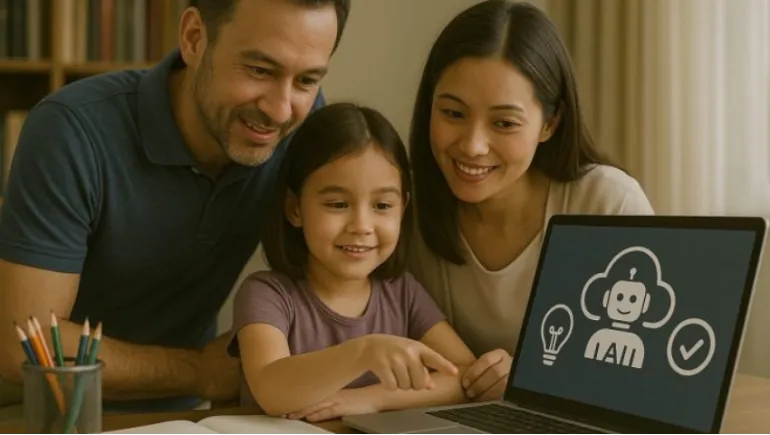
In 2025, Artificial Intelligence (AI) isn’t a distant concept from science fiction movies—it’s part of our everyday lives. From ChatGPT-powered study tools to TikTok’s recommendation algorithms and self-learning cars, AI has woven itself into the daily fabric of modern teens. While technology is growing faster than ever, one essential conversation is often missing at home: parents talking to their teens about AI.
The digital generation is already using AI without fully understanding how it shapes their thinking, creativity, and privacy. That’s why now, more than ever, parents need to step in—not to control, but to guide.
Today’s teens are surrounded by AI in education. Tools like ChatGPT, Grammarly, and Google Bard assist with homework, writing, coding, and even art creation. AI has become a silent tutor, improving how students learn and communicate.
But with great help comes great responsibility. Many students use AI tools to finish tasks quickly, sometimes without realizing the ethical implications of over-dependence. Here’s where parents come in—to teach balance.
Parents can ask:
These simple conversations can encourage critical thinking, helping teens use AI responsibly rather than blindly trusting it.
AI doesn’t just help teens with studies; it influences what they see and believe. Recommendation algorithms on platforms like Instagram, YouTube, and TikTok curate content based on user behavior. While this personalization feels convenient, it can trap young users inside echo chambers—reinforcing only what they already believe.
For example, if a teen often watches content about body image, the algorithm may continuously show similar videos, shaping their perception of beauty and self-worth.
Parents need to discuss how algorithms work and why they should diversify their content exposure. Explaining that AI reflects user patterns, not objective truth, helps teens become smarter digital consumers.
In a world where AI thrives on data, it’s critical for teens to understand how their personal information fuels AI systems. Every search, post, or photo contributes to data patterns used for advertising, predictive analytics, and even surveillance.
Parents can explain that AI learns from these inputs—and that what’s online stays online. Encourage your teen to:
By understanding the link between AI and data, teens can protect their digital footprint and make more informed online choices.
AI is not just for programmers—it’s transforming every field, from art to healthcare, law, and entertainment. For many teens, understanding AI can open doors to future careers in design, psychology, ethics, education, and more.
Parents can nurture curiosity by encouraging exploration. Ask questions like:
By introducing the concept of AI literacy, parents empower teens to not just use AI—but to create and shape it.
As AI becomes more advanced, mimicking human speech and emotion, it raises deep ethical questions. Can machines truly feel empathy? Should AI replace human judgment in certain tasks?
Teens growing up in this era need to think about these moral dimensions early on. Parents can use real-world stories—like AI-generated art controversies or biased algorithms in hiring systems—to spark meaningful discussions.
By engaging in such talks, parents help teens see AI as a human creation with both power and flaws, ensuring they grow into thoughtful digital citizens.
Building a healthy relationship with AI is like teaching good nutrition—it’s all about balance. Parents should encourage teens to:
Setting boundaries together—like time limits or discussing AI use during homework—fosters trust and responsibility, not control.
Many parents feel intimidated by AI, assuming it’s too complex. But remember—your teen might know the tools, but you know values and context. By learning about AI together, you bridge the generational gap and strengthen your bond.
Discussing AI as a family creates a shared learning experience. Watch documentaries, read articles, or even experiment with an AI chatbot. The goal isn’t to master every detail but to stay curious together.
The AI revolution isn’t coming—it’s already here. How teens understand and interact with AI will define the ethical and creative landscape of tomorrow. Parents who start these conversations today will raise a generation that doesn’t just adapt to AI but uses it wisely, creatively, and compassionately.
So, don’t wait for a perfect moment—start small. Ask your teen what they think about AI. You might be surprised by how much they already know—and how much you both can learn together.
AI will continue to evolve, but its future depends on the humans guiding it. As parents, your role is not to shield your teen from technology, but to teach awareness, responsibility, and balance. Open dialogue today builds stronger, safer, and more informed digital citizens for tomorrow.












Comments
There are no comments for this Article.